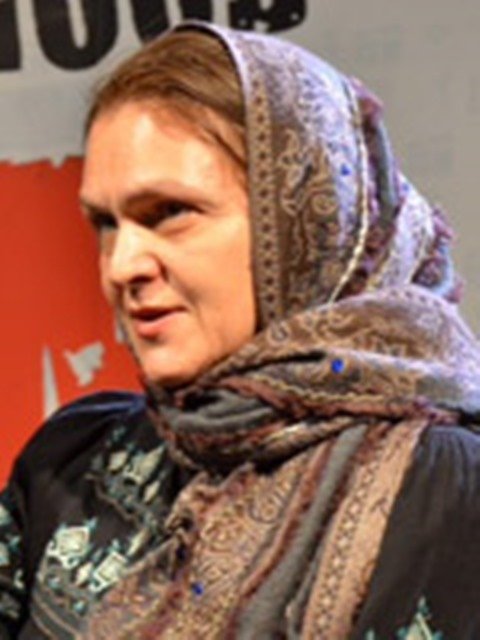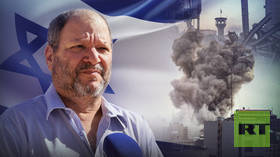What brings prosperous Westerners to join E. Ukraine militias?
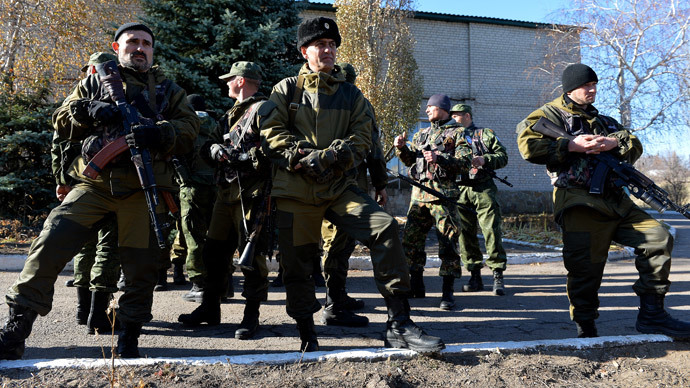
There are two major hot zones in the modern world where foreigners have been siding with militias - Donbass and Syria. These people get different treatment from their home countries, depending on a particular state’s attitude toward these events.
There’s somewhat of a consensus in the West that the Syrian war is a fair fight against the regime, whereas the Donbass events are a treacherous attempt to destabilize Ukraine. For this reason, the West connives at its people participating in the Syrian rebellion. There’s been extensive media coverage of Westerners fighting in this country. And those who returned home from the war, although they had to take precautions, as a rule did not suffer consequences in terms of their safety. Moreover, a number of Muslim reporters I know complain that whenever they seek to settle in the West they are implicitly told that they should fight among Syrian rebels before they’d have a chance to get a residence permit.
However most foreigners coming to east Ukraine’s Donbass are not going there for a better living, and are fully aware of the threats they may experience back home if their countries realize that they have served in a militia.
Ideology is also an important aspect in this matter. People going to Syria are the Sunni Muslims or Islam converts who are fighting as part of their religion-promoted obligation to help their brothers in faith. Whereas those going to Donbass may be of any or no religion; they may be left, or right – it doesn’t matter here.
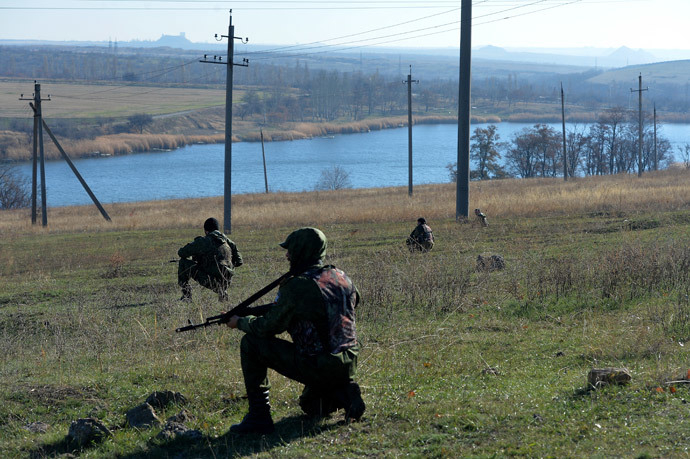
The Donbass militias raised all the banners possible – the monarchial flags, the Russian Civil War’s White Army flags, Novorossiya’s flags, the red Soviet flags, and the anarchist flags. The only thing that unites them is their protest against NATO expansion. As citizens of the NATO member states, most foreigners have grounds to worry about being persecuted upon their return home. This is why most Western militias reiterate that they are not hired guns, they don’t get paid here, and they don’t even participate in fights.
They go to Donbass at their own expense, and work only in auxiliary rear and medical services. But even among the Western volunteers there are those who want to fight, and they do fight.
It’s not easy for Westerners to get to Donbass. Unlike the Muslim recruiting structures, the anti-NATO activists don’t have a well-adjusted system yet. Moreover, Donbass still treats people from the NATO member states with caution, if not suspicion. They have to undergo certain trial procedures, and prove that their intensions are pure.
In Europe, the Greeks have been showing the most outspoken support for Donbass, especially since there is quite a large Greek community in the region, which has actively sided with the militias.
When I interviewed Greek politicians, all of them demonstrated solidarity with the east of Ukraine. Among them were left socialists such as Manolis Glezos, Member of the European Parliament, and the right such as Kassidiaris Ilias and Artemis Matthaiopoulos, Members of the Greek Parliament, spokesmen of the Golden Dawn, a Greek neo-Nazi party who has been imprisoned since July 2014, and the ultra-left such as Nikos Giannopoulos, head of the anarchist human rights center. However they are strongly against forming and sending international brigades to assist the militias.
So if Greeks, the biggest Western supporters of Russia and Donbass have such a view on sending international brigades what’s there to expect from other political forces in the West?
When foreigners come to Donbass they demonstrate their own choice that implies no safety guarantees – neither in their home countries, nor in Donbass. Obviously insurance policies don’t work here, and the medical standards hardly match European standards. However there are foreigners operating in Donbass.

I decided to tell two stories of the foreign militias. Both of them reflect two main trends – a young activist who hadn’t been burdened down by the USSR ideology, and a mature individual who’s been on a journey of a long ideological search; two different lives, a hopeful youth and disappointed maturity.
“We treat each other like brothers”
Soika (Jay Bird), 23, is from Slovakia. He has been in Donbass for two months. Back in Bratislava, he worked as a programmer. He comes from a strict Catholic family and has two sisters.
- My parents blessed me to come here. I will stay until the war is over, says Soika.
Back in Slovakia, Soika was outraged by the buildup of NATO weapons and the deployment of its forces there. He had no doubts that this buildup was aimed against Russia only.
- There are two US military bases [in Slovakia], with aircraft and tanks. Ukrainian miners training is based on the Slovakian armed forces. They’ve also opened a hospital there. Who do you think is going to use the new Slovakian hospital located on the border with Ukraine?
Soika asks a rhetorical question.
He went to Kiev to see the Maidan protests in the winter of 2014, and became reassured that the local, European and American media were distorting the truth in their coverage of the popular uprising against the former Ukrainian President Yanukovich.
- I saw the way the Right Sector people were operating on Maidan, and then I watched the reports and realized that it was propaganda rather than truth, says the Slovak. He is convinced that the Maidan protest was not a grass-roots uprising but rather an elaborated plan of overthrowing the government.
He was even more shaken by the fact that someone broke the windows in the unofficial consulate of Novorossiya in Bratislava. He doesn’t think that an unrecognized republic’s representation is against the law, as he believes that democracy gives peoples the right to their self-determination.
- Novorossiya has the right to exist. Although Europe declares the rights of peoples, it recognizes them in a selective manner, he comments.
The fact that others share his opinion reinforces his decisiveness.

- We have quite a number of Slovaks with us here; we even thought of forming a battalion, he explains.
Soika teaches tactical science in his brigade. He’s also been trained as a medical worker, and he can provide medical assistance on the battle field. These kinds of skills are really valuable for the militias.
He likes everyone in his brigade:
-We have neither military discipline nor chaos here. We treat each other like brothers and we joke a lot. After you’ve been under fire with someone they become more than your friends; they become your brothers, says Soika.
He dreams of becoming a Donbass citizen but he believes it’s still a long way away.
- When there’s independence then there will be citizenship as well. Otherwise, it’s hard to find someone to marry. All girls here have boyfriends, explains Soika.
“I want to see a world where an individual would not be a cog in the state machine”
“Sardan” (Sardinian) is a call sign of a 44-year old Italian who’s been in Donbass since mid-October. At 20 he served in the armed forces with an engineering unit. Despite being in the war he tries to stay away from all those aspects that make war attractive to men.
- Killing and destroying was never my specialty, I worked in the kitchen and other auxiliary facilities, explains Sardan.
He worked as a policeman for three years, and then he became a truck driver.
- I wanted to have my own small business, a pub. But it turned out to be a difficult task, and I ended up losing quite a bit of money, says Sardan.
He has an older brother, a father who’s 85, and a mother, 77. He has no children or family of his own.
- I don’t believe in ideology, I think it’s a cage for one’s mind. I’ve read a lot about politics and did quite a bit of research, and realized that all the teachings have mistakes in them. I am here in Donetsk because I believe in people’s right to self-determination. I am against NATO, and against the US’s power.
This is Sardan’s reason for coming to Donbass.
He is an atheist, despite his whole family being zealous Catholics. He never told anyone about his decision to go to Ukraine.
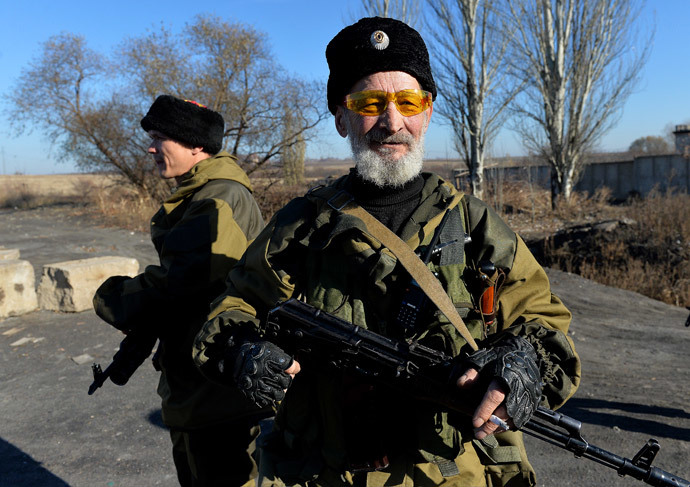
- I told my family that I was working in Germany, and that the connection worked poorly there. I communicate with them once a week, explains Sardan.
He hasn’t been to the frontline, nor is he planning to, but he wants to help in any way he can. He knows foreign languages, and is good with the internet.
- Italy gets a totally different coverage of what’s going on here. All they talk about is Russia’s invasion, says Sardan.
- I’ve been interested in politics for years. For once I want to try fighting something that I am against. The European Union, NATO, the US, unemployment – all these things are forming a system that is restraining and destroying my life. In this kind of life, you end up living like a blind man, Sardan explains.
– I want to see a world where an individual would not be a cog in the state machine, and where politics is not dominated by economics.
Abundance of religiousness is what fascinates him the most about Donbass:
- Most people here are very religious – they wear crosses, and carry rosaries; this is something you wouldn’t see in Italy. Everyone believes in their own way here. When a lady at the border learned that I was from Italy she went inside the church and brought me some holy water - this would’ve never happened in Italy. People are more religious here, and they try to demonstrate their faith. We have six icons hanging in our barrack: this would’ve been impossible in Italy.
He is reluctant to look into the future:
- These fights are going to last long. This isn’t a fight for Donbass’ freedom; this is a global geopolitical showdown.
He hasn’t decided yet how long he would stay here. He will have to go back home if his parents ask for help due to their health issues. For now, he’s been learning Russian and planning to work in the press center of the Humanitarian Battalion.
As a non-fighter he is not entitled to a military allowance, but he gets free food and lodging along with other militiamen.
- I didn’t come here to make money, Sardan explains. - I want to see closer friendly ties between Russia and Europe.
At the same time, he is running out of money, and winter is coming, so he feels that all the processes that had seemed easier are now stalled.
The statements, views and opinions expressed in this column are solely those of the author and do not necessarily represent those of RT.
The statements, views and opinions expressed in this column are solely those of the author and do not necessarily represent those of RT.
